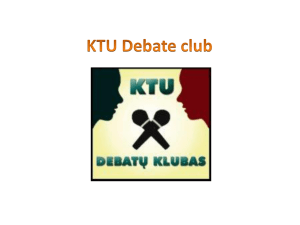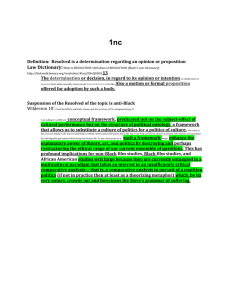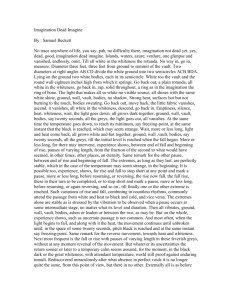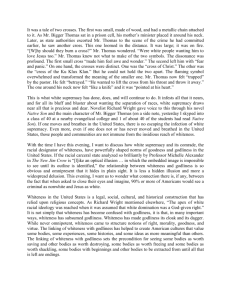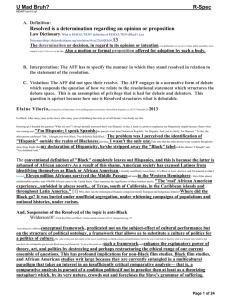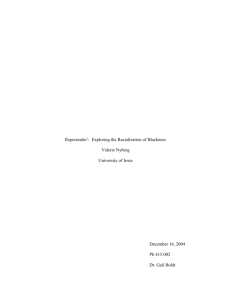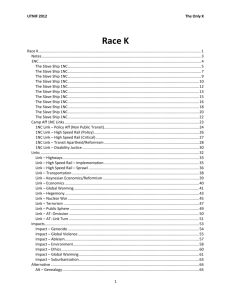Verbatim 4.6
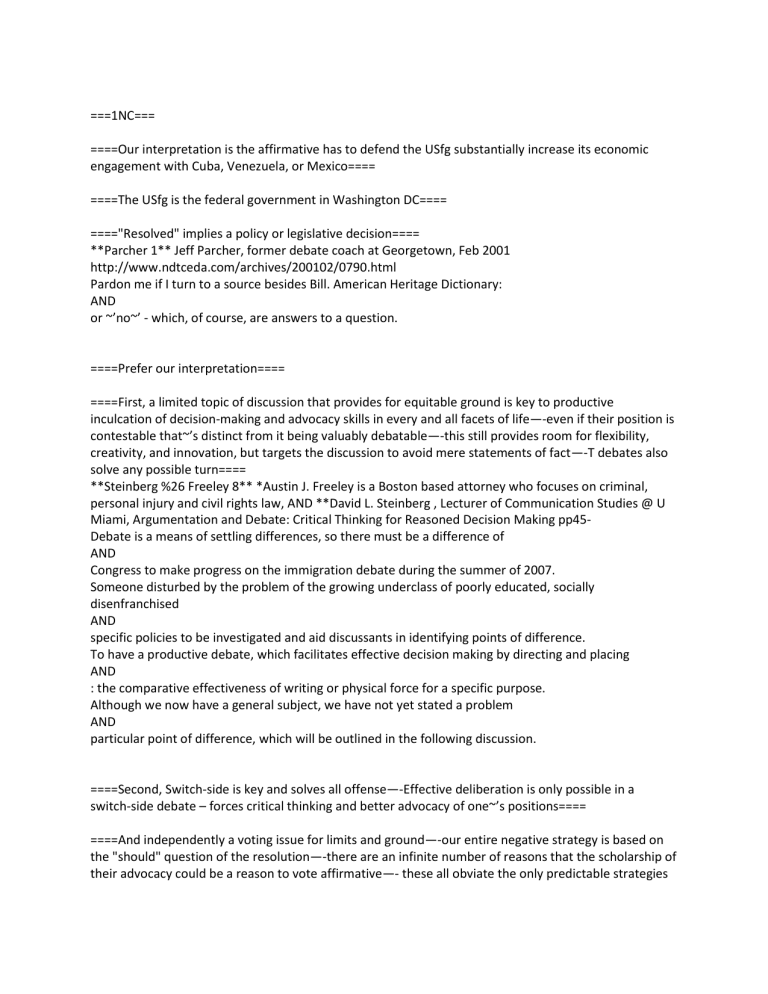
===1NC===
====Our interpretation is the affirmative has to defend the USfg substantially increase its economic engagement with Cuba, Venezuela, or Mexico====
====The USfg is the federal government in Washington DC====
===="Resolved" implies a policy or legislative decision====
**Parcher 1** Jeff Parcher, former debate coach at Georgetown, Feb 2001 http://www.ndtceda.com/archives/200102/0790.html
Pardon me if I turn to a source besides Bill. American Heritage Dictionary:
AND or ~’no~’ - which, of course, are answers to a question.
====Prefer our interpretation====
====First, a limited topic of discussion that provides for equitable ground is key to productive inculcation of decision-making and advocacy skills in every and all facets of life—-even if their position is contestable that~’s distinct from it being valuably debatable—-this still provides room for flexibility, creativity, and innovation, but targets the discussion to avoid mere statements of fact—-T debates also solve any possible turn====
**Steinberg %26 Freeley 8** *Austin J. Freeley is a Boston based attorney who focuses on criminal, personal injury and civil rights law, AND **David L. Steinberg , Lecturer of Communication Studies @ U
Miami, Argumentation and Debate: Critical Thinking for Reasoned Decision Making pp45-
Debate is a means of settling differences, so there must be a difference of
AND
Congress to make progress on the immigration debate during the summer of 2007.
Someone disturbed by the problem of the growing underclass of poorly educated, socially disenfranchised
AND specific policies to be investigated and aid discussants in identifying points of difference.
To have a productive debate, which facilitates effective decision making by directing and placing
AND
: the comparative effectiveness of writing or physical force for a specific purpose.
Although we now have a general subject, we have not yet stated a problem
AND particular point of difference, which will be outlined in the following discussion.
====Second, Switch-side is key and solves all offense—-Effective deliberation is only possible in a switch-side debate – forces critical thinking and better advocacy of one~’s positions====
====And independently a voting issue for limits and ground—-our entire negative strategy is based on the "should" question of the resolution—-there are an infinite number of reasons that the scholarship of their advocacy could be a reason to vote affirmative—- these all obviate the only predictable strategies
based on topical action—-they overstretch our research burden and undermine preparedness for all debates====
====Effective decision-making outweighs—-====
====Effective deliberation is the lynchpin of solving all existential global problems ====
Christian O. **Lundberg 10** Professor of Communications @ University of North Carolina, Chapel Hill,
"Tradition of Debate in North Carolina" in Navigating Opportunity: Policy Debate in the 21st Century By
Allan D. Louden, p311
The second major problem with the critique that identifies a naivety in articulating debate and
AND their time and political energies toward policies that matter the most to them.
The merits of debate as a tool for building democratic capacity-building take on
AND navigate academic search databases and to effectively search and use other Web resources:
To analyze the self-report ratings of the instructional and control group students,
AND searching, not just in academic databases. (Larkin 2005, 144)
Larkin~’s study substantiates Thomas Worthcn and Gaylcn Pack~’s (1992, 3) claim that
AND cite and rely upon from an easily accessible and veritable cornucopia of materials.
There are, without a doubt, a number of important criticisms of employing debate
AND to the possibilities of meaningful political engagement and new articulations of democratic life.
Expanding this practice is crucial, if only because the more we produce citizens that
AND with the existential challenges to democracy ~~[in an~~] increasingly complex world.
====Only portable skill—-means our framework turns case====
**Steinberg %26 Freeley 8** *Austin J. Freeley is a Boston based attorney who focuses on criminal, personal injury and civil rights law, AND **David L. Steinberg , Lecturer of Communication Studies @ U
Miami, Argumentation and Debate: Critical Thinking for Reasoned Decision Making pp9-10
After several days of intense debate, first the United States House of Representatives and
AND support the military action, and in the face of significant international opposition.
Meanwhile, and perhaps equally difficult for the parties involved, a young couple deliberated
AND made. Each decision maker worked hard to make well-reasoned decisions.
Decision making is a thoughtful process of choosing among a variety of options for acting
AND decision making, as do our school, community, and social organizations.
We all make many decisions even- day. To refinance or sell one~’s home, to buy a high-performance
SUV or an economical hybrid car. what major to select, what to have for dinner, what candidate CO vote for. paper or plastic, all present lis with choices. Should the president deal with an international crisis through military invasion or diplomacy? How should the U.S. Congress act to address illegal immigration?
Is the defendant guilty as accused? Tlie Daily Show or the ball game?
AND do we sort through it and select the best information for our needs?
The ability of every decision maker to make good, reasoned, and ethical decisions relies heavily upon their ability to think critically. Critical thinking enables one to break argumentation down to its component parts in order to evaluate its relative validity and strength. Critical thinkers are better users of information, as well as better advocates.
Colleges and universities expect their students to develop their critical thinking skills and may require students to take designated courses to that end. The importance and value of such study is widely recognized.
Much of the most significant communication of our lives is conducted in the form of debates. These may take place in intrapersonal communications, in which we weigh the pros and cons of an important decision in our own minds, or they may take place in interpersonal communications, in which we listen to arguments intended to influence our decision or participate in exchanges to influence the decisions of others.
Our success or failure in life is largely determined by our ability to make wise
AND customer for out product, or a vote for our favored political candidate.
===1NC ===
====Anonymous advocates affirm the resolution as a whole and the revolutionary ethics of Assata====
====The concept of identity inherent in the 1AC creates an "us" versus "them" mentality and ensures worldwide violence ====
**Boudreau 2k** (Nikki citing Amin Maalouf author of In the Name of Identity: Violence and the Need to Belong, 2000, http://www.csustan.edu/honors/documents/journals/entries/Boudreau.pdf, "Violence in the Name of Identity")
Ask anyone to define their identity and they will immediately rattle off a list of
AND of whichever one of their allegiances is most under attack" (26).
====The 1ACs usage of identity locates politics in a representational manner and prevents imperceptible political activism —- turns case ====
**Tsianos 08** (Vassilis, teaches sociology at the University of Hamburg, Germany, Dimitris
Papadopoulos teaches social theory at Cardiff University and Niamh Stephenson teaches social science at the University of New South Wales, "Escape Routes: Control and Subversion in the 21st Century"
Pluto Press)
In this sense imperceptible politics does not necessarily differ from or oppose other prevalent forms
AND this void into everyday politics that becomes the vital force for imperceptible politics.
====The counterplans pseudonym of anonymous solves their affirmative —- web activism proves====
**Halupka 11** (Max, The Flinders University of South Australia Faculty of Social and Behavioural
Sciences School of Social and Policy Studies Honours Program in Political Studies application for BA,
http://www.academia.edu/1220969/The_Evolution_of_Anonymous_as_a_Political_Actor, "The
Evolution of Anonymous as a Political Actor")
As a virtual community, Anonymous exists without traditional form or function, adhering only
AND opponents through theemployment of online activist techniques, also known as cyber activism.
===1NC===
====Text: The United States federal government should affirm the resolution as a whole and the revolutionary ethics of Assata.====
====A focus on reforming policies is necessary to fix societal problems – other criticisms are irrelevant to the day-to-day affairs that we confront ====
**McClean, 01** – Adjunct Professor of Philosophy, Molloy College, New York
(David E., "The Cultural Left and the Limits of Social Hope," Presented at the 2001 Annual Conference of the Society for the Advancement of American Philosophy, www.americanphilosophy.org/archives/past_conference_programs/pc2001/Discussion%20papers/david_mcclean.htm,
JMP)
There is a lot of philosophical prose on the general subject of social justice.
AND
. That is to say, they are not easily explained at all.
==Advocacy==
====The aff~’s focus on whiteness creates a "black-white paradigm" that excludes the oppression of other races—turns the advocacy====
Perea, 97 (Juan F. Perea, Professor of Law University of Florida, "RACE, ETHNICITY %26 NATIONHOOD:
ARTICLE: The Black/White Binary Paradigm of Race: The "Normal Science" of American Racial Thought",
October 1997, California Law Review 1213)
Thomas Kuhn, in The Structure of Scientific Revolutions, n4 describes the properties of
AND sake of a paradigmatic, linear presentation of the evolution of equality doctrines.
====The state must be engaged—-action can be reoriented away from past abuses, the alt goes too far====
**Williams and Krause 97** Michael, assistant professor of political science at the University of
Southern Maine and Keith, professor of political science at the Graduate Institute of International
Studies, associate professor of political science at York University, Critical Security Studies: Concepts and
Cases, edited by Krause and Williams, p. xvi
Many of the chapters in this volume thus retain a concern with the centrality of
AND of influencing what remains the most structurally capable actor in contemporary world politics.
====Mono-causal theories like whiteness shut down communication by making our self-defense automatically biased—this reifies racism and leads to endless squabbling about authenticity====
Jack **Niemonen 10**, American Sociologist, 41(1), 48-81, "Public Sociology or Partisan Sociology? The
Curious Case of Whiteness Studies", Online
Despite recognition that racial classification systems are not constant, proponents of whiteness studies treat
AND underpins a political project that could not succeed in the absence of reification.
====The "black-white paradigm" pushes non-black racism "out of the box"—discounts and marginalizes racism====
Perea, 97 (Juan F. Perea, Professor of Law University of Florida, "RACE, ETHNICITY %26 NATIONHOOD:
ARTICLE: The Black/White Binary Paradigm of Race: The "Normal Science" of American Racial Thought",
October 1997, California Law Review 1213)
Paradigms of race shape our understanding of race and our definition of racial problems.
AND those that will not fit the box are often not seen at all."
====The K~’s attempt to open the debate activity to questions of race, racism and to challenge the dominant ideology will result in a buttressing of white privilege—they ignore the ontologically expansive nature of whiteness and in their attempt to create an environment to disrupt white privilege, which provides the perfect means for whiteness to assert itself====
Sullivan, 07 (Shannon Sullivan, associate Professor of Philosophy and Women~’s Studies at
Penneysylvania State University, "Revealing Whiteness: The Unconscious Habits of Racial Privilege",
2007, pg. 10-11)
In particular, relocating out of geographical, literary, political, and other environments
AND in an ongoing struggle to find ways to use white privilege against itself.
====Their critiques of the exclusionary nature of a framework read debate as monolithic forms of power, but this misunderstands instrumental play, which introduces far more radical politics into debate—the claim that debate should be limitless and free leads to a dead end of infinite possibility that is self-defeating====
Armstrong, 2000 (Paul B. Armstrong, Professor of English at SUNY-Stony Brook, "The Politics of Play: The
Social Implications of Iser~’s Aesthetic Theory," New Literary History, 31.1, 2000, pg. 217-219
Free play and instrumental play are inextricably intertwined in the games texts play as they
AND indifferent tolerance of the other but ironic and energetic engagement with difference. 6
====Positing whiteness as the source of all violence obscures the historical process of racial reification and dooms any attempt at intersectional analyses of oppression====
Niemonen, 10 (Jack Niemonen, American Sociologist, "Public Sociology or Partisan Sociology? The
Curious Case of Whiteness Studies", 41(1), pg. 48-81, EBSCOhost)
Despite recognition that racial classification systems are not constant, proponents of whiteness studies treat
AND arguments inevitably result in anger and bafflement (Gillborn 1996; Kolchin 2002).
====Inherent equality of all beings requires utilitiarianism====
Cummiskey 96 (David Cummiskey, Associate Professor of Philosophy at Bates College %26 a Ph.D. from
UM, 1996, Kantian Consequentialism, pg. 145-146)
In the next section, I will defend this interpretation of the duty of beneficence
AND equal consideration suggests that one may have to sacrifice some to save many.




